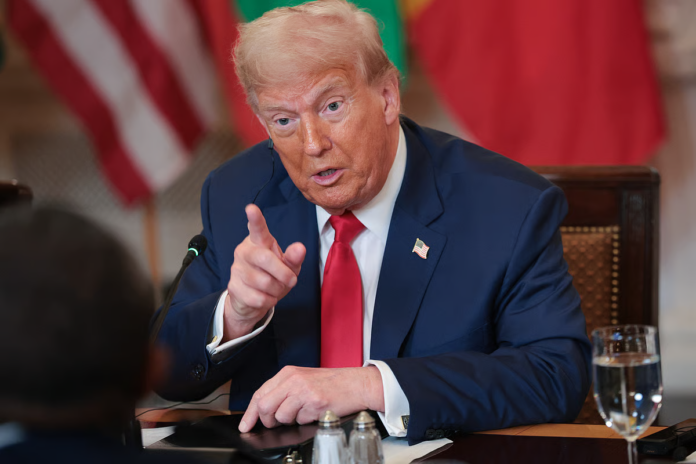U.S. President Donald Trump on Saturday intensified his administration’s trade offensive by threatening to impose 30% tariffs on imports from Mexico and the European Union, set to take effect on August 1, following unsuccessful efforts to finalize broader trade agreements with the two major trading partners.
In separate letters posted on his Truth Social platform, Trump formally notified European Commission President Ursula von der Leyen and Mexican President Claudia Sheinbaum of the new tariffs, signaling a hardline return to the tariff-based strategy that rattled global markets earlier this year.
The EU and Mexico swiftly criticized the proposed duties, calling them disruptive and unjust, while reiterating their willingness to continue negotiating a comprehensive deal before the implementation deadline.
Trump’s move affects two of America’s largest trading partners. In addition to the 30% blanket tariff, existing sector-specific tariffs will remain in place—including 50% duties on steel and aluminum and 25% on auto imports. Trump clarified the new tariff level is “separate from all sectoral tariffs.”
According to officials, the latest round of letters extends beyond just the EU and Mexico. Twenty-three additional countries, including Canada, Japan, and Brazil, also received notices of impending tariff hikes ranging from 20% to 50%, with copper imports facing a 50% duty.
The escalation comes despite signs of a resilient U.S. economy and a buoyant stock market. Trump, emboldened by this economic strength, appears committed to using tariffs as leverage, even as negotiations falter. Although he pledged in April to use a 90-day delay period to finalize trade agreements, only framework deals with Britain, China, and Vietnam have been reached so far.
In his letter to the EU, Trump demanded unrestricted market access for U.S. goods, linking it to a reduction in the bloc’s trade surplus. “The European Union will allow complete, open Market Access to the United States, with no Tariff being charged to us, in an attempt to reduce the large Trade Deficit,” he wrote.
Von der Leyen warned the tariffs could “disrupt essential transatlantic supply chains, to the detriment of businesses, consumers and patients on both sides of the Atlantic.” While she confirmed that the EU would continue to seek a deal, she stressed that Brussels was prepared to take “proportionate countermeasures” to protect its interests if necessary.
Meanwhile, Mexico’s economy ministry confirmed that U.S. officials had informed them of the tariff move during a meeting on Friday. The ministry called the decision “unfair treatment” and stated Mexico did not agree with the rationale provided.
Notably, Mexico’s 30% rate is lower than Canada’s proposed 35% tariff, even though U.S. Customs and Border Protection data shows a significantly higher volume of fentanyl seizures at the southern border compared to the Canadian one.
“Mexico has been helping me secure the border, BUT, what Mexico has done, is not enough,” Trump wrote. “Mexico still has not stopped the Cartels who are trying to turn all of North America into a Narco-Trafficking Playground.”
Despite this criticism, Mexico remains heavily dependent on the U.S. market, sending more than 80% of its exports northward. In 2023, Mexico overtook China to become America’s largest trading partner.
The EU had initially aimed for a full trade deal but has shifted focus toward a framework agreement, following the UK model, that leaves many elements to future negotiation. The 27-member bloc remains internally divided, with Germany pushing for a quick deal to protect industry, while France and other members resist a one-sided agreement on U.S. terms.
Jacob Funk Kirkegaard, a senior fellow at Bruegel, a Brussels-based think tank, cautioned that retaliatory tariffs by the EU could trigger a market-rattling escalation, similar to the U.S.-China tariff standoff. “U.S. and Chinese tariffs went up together and they came back down again. Not all the way down, but still down together,” he noted.
The new tariffs have also strained diplomatic relations with longtime U.S. allies. Japanese Prime Minister Shigeru Ishiba recently signaled that Japan should reduce its reliance on the U.S., while Canada and some EU states are considering purchasing non-U.S. weapons systems to diversify their defense options.
Meanwhile, U.S. customs duty revenue has surged, crossing $100 billion in the current federal fiscal year up to June, according to Treasury data released Friday, suggesting Trump’s tariff push is delivering significant returns to the U.S. government—even as it stirs global unease.




